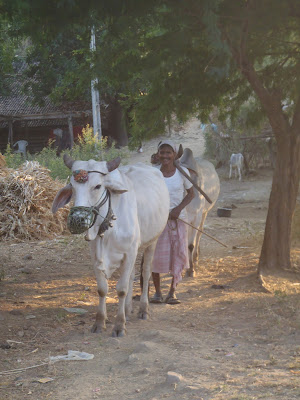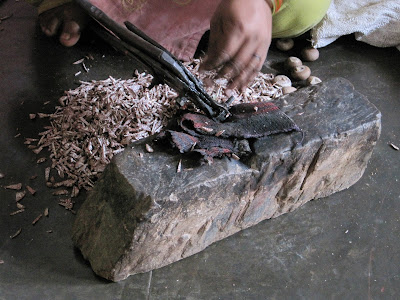Out of all the stories that I tell people now that I am home, the first that comes to mind is the weekend spent with Utthan. In a way I feel like this was an “authentic” experience, but I hate to use that word because I know that it is not a proper way to reflect what I mean but it is also quite hard to describe what I mean and feel about this experience. Acknowledging that “authentic” isn’t right, this weekend provided a glimpse into the realities of people living in incredibly strained circumstances.
Talking to such lovely and warm people about such extreme hardships and seeing the determination in their lives is something that would be incredibly hard to forget. I have never seen these looks in Canada. I have seen people talk about hardships, traumas and discrimination before, and have been completely moved by it when it happens, but there was something about the feeling being put out during our conversations that made this different. There wasn’t a feeling of victimization, but rather it felt more like, if you know what happened was wrong, then what can you do about it if it you would like it to be better?
This idea of taking ownership over one’s trauma and experiences, although it is clear that anger, pain and grief runs deep, portrays such a high level and sense of personal strength– there doesn't seem to be some sense of entitlement to better treatment solely because of terrible past treatments. Instead there is a sense of fight, moving forward and getting on with things. Life must go on and when you live in a place where resources are scarce but people are plentiful, you can easy be pushed by the wayside if you do not get up and help yourself.
It is this collection of people who got up, decided to help themselves and those close to them out of some of the bad situations they are being personally faced with that seems to be the solid foundation of which Utthan works on. If there wasn’t this spirit in people, if they were just waiting around for someone else to come and fix their problems, then visiting such places would have been dreadfully depressing and would not have left us with the feeling of hope and empowerment that it did. This feeling of spirit and self-determination was in the air and it was contagious. I hope I was infected by this spirit.
Looking back now, I’ve been trying to take a deeper look into my own life, perhaps borrowing a lens from Gandhi or Nafisa, and see some truths about my reality that I was never able to see or if I did see, truly understand before. When we were in India, starting our residency in Ahmedabad, I was just trying to soak up everything we were learning about Gandhi and his views for the world. I have purchased his autobiography which I plan to read this holiday season to hopefully allow further reflections on my experiences in India (and hopefully provide some further insight afterthought onto my off-the-cuff blog posts).
I know that I will not be throwing out my clothing, declaring celibacy or vegetarianism, not consuming alcohol or ceasing to “pamper” myself – that’s just too much extreme change to spur out of short trip so it’s wise to keep a little perspective. I know myself and know that I am an indulgent person, not the self-sacrificing type of person which Gandhi clearly embodied. However, this does not mean that I can look at some of these core messages of Gandhi or Nafisa and Utthan, focus on what it is that is trying to be achieved with them and try and find some personally manageable and realistic ways for me to aid in reaching such goals in a way that doesn't completely contradict the life I have built and that has been built for me by family now and before I was born.
Talking to such lovely and warm people about such extreme hardships and seeing the determination in their lives is something that would be incredibly hard to forget. I have never seen these looks in Canada. I have seen people talk about hardships, traumas and discrimination before, and have been completely moved by it when it happens, but there was something about the feeling being put out during our conversations that made this different. There wasn’t a feeling of victimization, but rather it felt more like, if you know what happened was wrong, then what can you do about it if it you would like it to be better?
This idea of taking ownership over one’s trauma and experiences, although it is clear that anger, pain and grief runs deep, portrays such a high level and sense of personal strength– there doesn't seem to be some sense of entitlement to better treatment solely because of terrible past treatments. Instead there is a sense of fight, moving forward and getting on with things. Life must go on and when you live in a place where resources are scarce but people are plentiful, you can easy be pushed by the wayside if you do not get up and help yourself.
It is this collection of people who got up, decided to help themselves and those close to them out of some of the bad situations they are being personally faced with that seems to be the solid foundation of which Utthan works on. If there wasn’t this spirit in people, if they were just waiting around for someone else to come and fix their problems, then visiting such places would have been dreadfully depressing and would not have left us with the feeling of hope and empowerment that it did. This feeling of spirit and self-determination was in the air and it was contagious. I hope I was infected by this spirit.
Looking back now, I’ve been trying to take a deeper look into my own life, perhaps borrowing a lens from Gandhi or Nafisa, and see some truths about my reality that I was never able to see or if I did see, truly understand before. When we were in India, starting our residency in Ahmedabad, I was just trying to soak up everything we were learning about Gandhi and his views for the world. I have purchased his autobiography which I plan to read this holiday season to hopefully allow further reflections on my experiences in India (and hopefully provide some further insight afterthought onto my off-the-cuff blog posts).
I know that I will not be throwing out my clothing, declaring celibacy or vegetarianism, not consuming alcohol or ceasing to “pamper” myself – that’s just too much extreme change to spur out of short trip so it’s wise to keep a little perspective. I know myself and know that I am an indulgent person, not the self-sacrificing type of person which Gandhi clearly embodied. However, this does not mean that I can look at some of these core messages of Gandhi or Nafisa and Utthan, focus on what it is that is trying to be achieved with them and try and find some personally manageable and realistic ways for me to aid in reaching such goals in a way that doesn't completely contradict the life I have built and that has been built for me by family now and before I was born.




































































